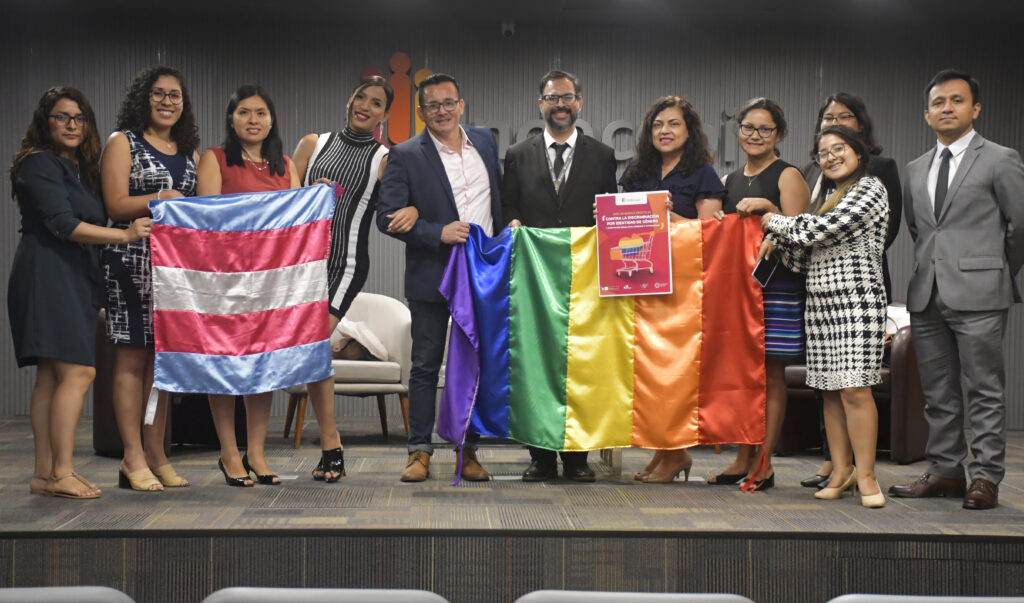
It all began with a woman in Lima seeking bank credit. She was refused. Not based on financial reasons, but because her state identification card identified her as male.
The woman filed a discrimination suit against the bank. And while she did not win the lawsuit, the presiding judge recommended that Peru’s national consumer protection agency, Indecopi, prepare guidelines to reduce discrimination against LGBTQI consumers in Peru.
That was the kernel that developed into the “Guide to Good Practices Against Discrimination Based on Gender Identity and Sexual Orientation in Commerce and Advertising,” issued by Indecopi and Prosa, an organization that supports the rights and health of the LGBTQI community in Peru and is a partner of Vital Strategies as part of the Data for Health Initiative. The guide was launched on International Transgender Day of Visibility, March 31, 2023.
The guide provides purveyors of products and services the information they need to implement good practices. Its aim is to ensure that each consumer receives fair and equitable treatment in commercial transactions, and that no one—particularly LGBTQI customers—is discriminated against for any reason.
“This is an example of inter-institutional cooperation between the state and civil society in the fight against discrimination,” said Juan Manuel Castillo, a lawyer and activist specializing in identity rights for the LGBTQI community, and in-house legal counsel for Prosa. The result of this public-private partnership is a product designed to empower the consumer.
Prosa was among the civil society champions that illuminated the need to protect LGBTQI consumers against unfair business practices. The partnership got off the ground last August, when Prosa organized an event advocating for the right to legal documents that reflect their gender identity for people who are transgender in Peru.
At that event several members of the transgender community spoke of the attacks on their dignity they face—even when doing something as simple as going out for a meal or buying a bottle of water. Their words touched the Director of the National Consumer Protection Authority, Dr. Ana Peña Cardoza, who had been invited to speak. She vowed to work with the civil society organizations to protect the LGBTQI community from such discriminatory practices.
“Luckily, many public officials are aware of the problems that the LGBTQI community is going through in Peru,” said Castillo.
Prosa worked with the consumer protection agency to develop the guide, which provides information for businesses about good practices to protect LGBTQI clients against discrimination, including principles of equality and human rights, and marketing norms that protect consumers from discriminatory representation.
Furthermore, the consumer protection agency has identified corrective measures for businesses—from apologies issued to targeted consumers, to public signage that clearly states that discriminatory treatment of any person is not permitted. Customers who have a complaint may file it with Indecopi, which monitors and enforces consumer protections.
Laws in Peru make it legally difficult for transgender people to change their state-issued identification to conform with their gender. But this is not the only factor contributing to the discrimination transgender people face as consumers. Owners and employees of private businesses—motivated by social prejudices—often discriminate against LGBTQI people either through mistreatment or by limiting access to products or services.
The LGBTQI consumer protection guide has already received international attention. It was among the top three finalists recognized at the 2023 Consumer Education Awards in Sydney, Australia, presented at a conference of the International Consumer Protection and Enforcement Network; this global network convenes more than 70 consumer protection authorities.
This recognition, said Castillo, has energized the next phase of the consumer protection work in Peru: conducting a series of training sessions for companies and consumers throughout Peru to eradicate stigma and discrimination in commerce based on sexual orientation and gender identity. The training is targeted not only to chief officers of companies, but to all employees—especially those that have direct contact with customers. And it helps to educate LGBTQI consumers about the actions they can take if they face discrimination.
While the state authorities still have a long way to go in recognizing transgender rights, Castillo said, he is grateful for the allies at the consumer protection agency. “We have institutions like Indecopi that tell us yes, you exist. We know it and we are implementing something to try to reduce discriminatory acts against you.”
Get Our Latest Public Health News
Join our email list and be the first to know about our public health news, publications and interviews with experts.
About Vital Strategies’ CRVS work
The Civil Registration and Vital Statistics Program at Vital Strategies has collaborated with governments since 2015 to ensure that all people are counted, through registering births, deaths and causes of death in 29 countries. Improved registration benefits individuals, enabling access to education, health care and inheritance rights, and gives governments a clearer picture of population trends and causes of death and disease, enabling them to know where and how to direct resources. To learn more, visit: https://www.vitalstrategies.org/programs/data-for-health/